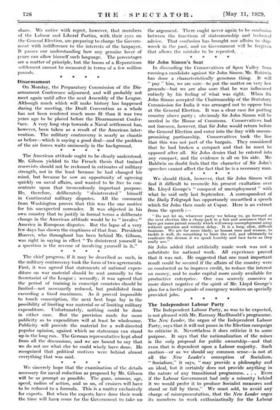The American attitude ought to be clearly understood. Mr. Gibson
yielded to the French thesis that trained reservists should not be reckoned in estimates of military strength, not in the least -because' he had changed his mind, but because he saw an opportunity of agreeing quickly on naval affairs, and wanted- to be free to con- centrate upon that tremendously important purpose. He, therefore, deliberately " disinterested " himself in Continental military disputes. All the comment from Washington proves that this was the one motive for his unexpected surrender. It was objected in his own country that to justify in formal terms a deliberate change in the American attitude would be to " involve " America in European disputes. But the lapse of a very few days has shown the emptiness of that fear. President Hoover, who throughout has been behind Mr. Gibson, was right in saying in effect " To disinterest yourself in a question is the reverse of involving yourself in it."
* * * *










































 Previous page
Previous page